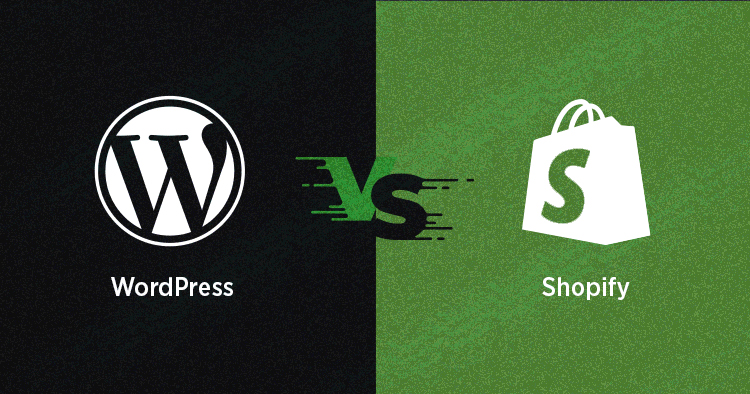
If you are looking for a reliable ecommerce platform, there are plenty of options out there for you to consider. However, one of the biggest decisions that you will have to make is whether you want to choose a hosted ecommerce platform, or if you’d like to go with a self-hosted option.
This is going to have a major impact on how your store performs, and its management as well. Therefore, it’s important for you to make sure that you do your research and choose the right option. Your best options might end up with a debate on Shopify vs WordPress.
The Shopify vs WordPress debate continues to escalate. While some people preferring the comfort and ease of use that Shopify offers, there are others who prefer the reliability that WordPress has to offer.
WordPress is arguably the most flexible content management system in the world, used by millions of websites around the world. It’s not just designed for managing your content; you can also use the right plugins with WordPress to manage your ecommerce store effectively.
Think of it as the core foundation on which your entire store will be based. If you are confused between Shopify vs WordPress, there are a number of important things to consider. In this article, we are going to run through the key differences between the two, and identify the best option based on your needs.
What Is Shopify?
Shopify is a hosted ecommerce platform that was founded in 2006. Over the past 15 years, Shopify has grown on to become one of the biggest ecommerce platforms in the world. Millions of ecommerce store owners prefer Shopify because it offers a simple pathway to creating your online store.
You don’t need to know a line of code (though it helps!), and the simple drag-and-drop functionality makes Shopify a fantastic option for people who are looking to just launch their own store. While it’s simple, there are a few issues with Shopify that irks most experienced ecommerce store owners.
What Is WordPress?
At its core, WordPress is a simple content management system that you can use to schedule content on your website. However, the reason why WordPress is so popular is because you can choose from a host of different plugins to create virtually any kind of website you want.
It’s incredibly versatile, and it works a treat. As you can imagine, there are quite a few differences between both platforms. The best part about WordPress is that you can use WooCommerce, a fantastic platform that makes it considerably easy for you to launch your own store.
At Cloudways, we offer the WooCommerce Starter Bundle, a fully integrated bundle that offers all major plugins you need to launch your store right out of the box. The WooCommerce Starter Bundle includes plugins like Shopping Cart Abandonment Recovery, Kadence email Designer, WooCommerce Shipping & Tax, and many others to get you started.
Launch Your WooCommerce Store Today!
Choose the WooCommerce Starter Bundle. Avoid the early struggles, and start selling immediately!
Shopify vs WordPress – 9 Key Differences
Shopify or WordPress? In the following paragraphs, we shall run through 9 key differences that set WordPress and Shopify apart from each other.
1. Pricing
Pricing is a key concern for a lot of people. And, in the battle between Shopify vs WordPress, there’s a stark difference in pricing.
Shopify Pricing

As you can see, Shopify offers a 14-day free trial. The pricing for their “Basic” plan starts from $29.99/mo, with the next tier costing $79.99/mo. If you want the Advanced Option, expect to pay $299.99/mo. Shopify does offer its own hosting, so that’s not something you need to worry about.
WordPress Pricing
WordPress is completely free to use. If you choose your own hosting option, you don’t have to spend a single penny to install WordPress on your server. So, in this Shopify vs WordPress battle, WordPress is the clear winner.
Since WordPress is completely free and open-sourced, you don’t have to pay anything to install it. However, you do need to factor in the costs of hosting and the domain name.
2. Interface and Ease of Use
The interface of the platform plays an important role in how easy it is to use. Let’s compare the interfaces of both Shopify and WordPress.
Shopify Interface
 Source: Shopify
Source: Shopify
The reason why so many people prefer Shopify is because of its ease of use. It’s an incredibly simple platform that makes it easy for you to launch and manage your online store. Shopify shows you all the important aspects of your online store in a very simple manner.
If you are confused between Shopify or WordPress, think of it this way: the former is ideal for people with little to no technical knowledge, and those who just want to launch their own stores.
WordPress Interface

WordPress requires a bit of understanding to use properly. It’s also fairly simple, but you need to understand how to integrate plugins and use them properly. The good thing here is that almost everything is easy to use and manage, with all functions described conveniently. There are also a bunch of different Shopify alternatives that you can consider apart from WordPress, of course.
3. Templates and Themes
If you are confused between Shopify or WordPress, the choices of themes or templates each possesses might sway your decision. Let’s compare Shopify vs WordPress in terms of themes and templates offered.
Shopify Themes

When comparing Shopify or WordPress, you should know that Shopify has a pretty fantastic theme store with more than seventy themes, all of which are responsive and designed for quick execution. It’s not just the themes; Shopify also has a fantastic array of customizable options so you can easily personalize each and every theme, using their own template language known as Liquid.
WordPress Themes

This is the part where the battle between Shopify vs WordPress begins to change. Since WordPress is open-source, anyone can create a theme. WordPress has its own theme store, or you can also choose fast themes designed to boost your page load speeds.
4. Plugins and Extensions
Plugins and extensions are also important when we consider the battle between Shopify vs WordPress.
Shopify Plugins and Extensions

Shopify has a comprehensive ecommerce app marketplace, known as the Shopify App Store. There are hundreds of different apps on the marketplace that you can choose from, depending on your requirements. Integration is easy and fairly simple, so you don’t need to have much technical knowledge to install these apps on your platform.
There are more than 2,500 plugins and extensions, both paid and free, that you can integrate to your store using a simple API.
WordPress Plugins
In this comparison between Shopify and WordPress, it’s easy to see the difference between the two platforms. When you put Shopify vs WordPress only in terms of plugins, WordPress comes out as the clear winner. It’s a major difference between Shopify and WordPress.
The reason for this is straightforward: WordPress is open-source, and has hundreds of thousands of plugins. If you are confused between WordPress or Shopify based on plugin support, the former is clearly a wise choice.
There are almost 60k free plugins, and thousands others as well. Depending upon your needs, you can easily choose a suitable plugin and then compare your options. There are plugins that you can use to boost your website, and others for adding new or unique features as you see fit.
So, if your primary concern with Shopify and WordPress is plugin and add-on support, WordPress is by far the clear winner.
5. Ecommerce Features
Now, let’s compare the most important aspects of Shopify and WordPress: ecommerce features. Here’s what you should know.
Shopify Ecommerce Features

Shopify has a bunch of ecommerce features that makes it such a popular choice for use as an ecommerce platform. Here are some of the main features of the platform:
- It’s ready for mobile commerce
- All themes are responsive
- It doubles up as a domain registrar
- Has a comprehensive blogging platform
- Very intuitive web builder
- Offers a free SSL certificate
- A range of shipping options and payment gateways
- Automatic tax calculation
- Comprehensive store management features including account management, product management, and email templates
- Shopify Fulfillment Network and a range of other fulfillment solutions
- Generated sitemap.xml
- Integration with social selling platforms like Facebook
- Google Ads credits ($100)
WordPress Ecommerce Features

WordPress isn’t an ecommerce platform by default. It’s a content management system, so you have to install WooCommerce in order to turn it into an ecommerce platform. Once you do though, the list of features is limitless. You can customize your store any way you want, including all of the features given above and a lot more.
- Custom shopping carts
- Shipping options
- Extensive product page management
- Detailed revenue reporting
- Managing returns
- Stock inventory levels
- Multiple design management solutions
- Managing multiple currencies
- Mobile responsive sites
6. Payment Options
Now, in this battle between Shopify and WordPress, let’s focus on the payment options.
Shopify Payment Gateways
Shopify has its own payments solution, known as Shopify Payments. You can enable any of the methods that you want in the list of payment providers. Customers can also pay using other methods, including PayPal, Apple Pay, and Amazon Pay. There are a bunch of US payment gateways that you can integrate with your Shopify store.
WordPress Payment Gateways

On its own, WordPress doesn’t have any integrated payment options. However, if you pair it with a plugin like WooCommerce, you have no shortage of options available to you.
Common payment gateways include:
- Stripe
- PayPal
- Square
- Amazon Pay
- Braintree
- RazorPay
- Mercado Pago
- Afterpay
You can search from plenty of payment gateways, including BNPL apps, and use those with your store.
7. SEO Features
Next up in our battle between Shopify and WordPress is SEO. Let’s compare Shopify vs WordPress in terms of SEO.
Shopify SEO Features
Shopify integrates fluidly with a bunch of SEO plugins and extensions, and you can also use it for marketing purposes. Shopify also allows you to connect custom meta fields for adding more data fields and comprehensively expanding the descriptions of your products.
There are plenty of ways to optimize your Shopify store, and the company continues to add new features in the mix. Shopify gives you an array of tools, including the option to add custom meta titles, custom URLs, redirects, and a whole lot more.
WordPress SEO Features
WordPress has a whole array of plugins that you can use to improve your website’s SEO performance. The Yoast SEO plugin is arguably the most popular choice for WordPress websites, and it’s also fairly easy to install on your site. However, when you compare the sheer range of options that WordPress offers as third-party extensions, you simply can’t go wrong.
In the battle between Shopify vs WordPress, the latter is the clear winner in this field.
8. Help and Support
Now, let’s compare the help and support options offered by both Shopify and WordPress.
Shopify Help and Support

When comparing Shopify or WordPress, support is a key concern. Shopify offers a range of help and support options to its clients. Their support options include:
- A detailed knowledge base known as Shopify Help Center
- The Shopify community
- Email ticketing
- Chat solution
WordPress Help and Support

While it looks barebones when you consider the help options, WordPress actually offers a lot more. They have one of the largest community support bases in the world, primarily because the platform is open-source. You can find answers to virtually every question you might have, and you can also find a developer on multiple platforms who might be willing to help you out with your store.
9. Maintenance and Security
Finally, let’s compare maintenance and security between WordPress and Shopify.
Shopify Maintenance and Security
Since Shopify is a hosted solution, they primarily care for maintenance and security. You will want to take care of the basics, including 2FA and setting up a strong password for your account. Apart from that, there’s not a lot you need to worry about; Shopify will handle the rest of the technical stuff for you.
WordPress Maintenance and Security
WordPress is different. It’s a self-hosted platform, so you’ll have to worry about maintenance and security on your own. This involves installing different WordPress security plugins and regularly keeping on top of the security of your site. These are the main differences between Shopify and WordPress.
The Bottom Line
Depending upon your needs and your potential for scaling your business, you will want to make an informed decision. It’s probable that you are going to stick with either of these options for the long haul, so you need to weigh the differences carefully before deciding which one to choose. Check out the Cloudways webinar on the quest for the fastest WordPress. You can also read a series of comparative articles between:
Q1. Which one is better, Shopify or WordPress?
There’s no “better” option. However, if you want a solution that’s fully customizable and allows you to control every element of your store, go with WordPress.
Q2. Which one is better for dropshipping, WordPress or Shopify?
Both are excellent, though the dropshipping plugins on WordPress make it a better choice compared to Shopify.
Q3. Can I use Shopify with my WordPress site?
No. Shopify used to have a WP plugin, but they pulled it.
Q4. Is WordPress good for dropshipping?
Yes, WordPress is excellent for dropshipping, given the range of customizable options and the plugins that it offers.
Abdul Rehman
Abdul is a tech-savvy, coffee-fueled, and creatively driven marketer who loves keeping up with the latest software updates and tech gadgets. He's also a skilled technical writer who can explain complex concepts simply for a broad audience. Abdul enjoys sharing his knowledge of the Cloud industry through user manuals, documentation, and blog posts.


